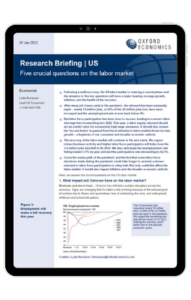Five crucial questions on the US labor market

Following a swift recovery, the US labor market is entering a crucial phase and the answers to five key questions will have a major bearing on wage growth, inflation, and the health of the recovery.
After steep job losses early in the pandemic, the rebound has been unusually rapid – nearly 19 million jobs, or 84% of the 22 million jobs lost, have been recouped and the unemployment rate is now back below 4%. But labor force participation has been slow to recover, leading to a severe labor shortage that is extending into 2022.
This year, a labor supply rebound should act as a relief valve for excessively high wage pressures. It should also ensure the ‘income baton’ is passed from fiscal stimulus to labor market-driven income growth – a keystone of our consumer and broader economic outlook.
The recovery of the labor market will continue in fits and starts. We expect robust business activity and higher labor force participation will help close the 3.6 million jobs shortfall in H2 2022. We also anticipate the unemployment rate falling toward 3.5% by year-end and the participation rate rebounding to 62.5%.
Given the murky path of the pandemic and the fact that some labor force decisions made during the pandemic could take longer to unwind, a slower rebound in labor force participation is a key risk. Not only could this affect the labor market; it would also impact inflation and the broader economic outlook.
Read the report for full answers to the five crucial questions on the US labor market:
- What impact will Omicron have on the labor market?
- How tight is the labor market?
- Will labor force participation rebound?
- Will wage growth stay hot?
- How close are we to ‘full employment’?
Tags:
Related Research

Post
Industry Key Themes 2025: Industrial landscape at a critical juncture
Following prolonged weakness in 2022 and 2023, industrial growth is now regaining momentum.
Find Out More
Post
Czech Republic: Near-term recovery, long-term struggle
We believe the Czech Republic will move to the upper one-third of the fastest-growing EU economies in 2025-2026 after lagging its EU peers in the last four years. However, much of this will be catch-up growth, mainly in consumer spending, where a large shortfall remains. Relative to pre-pandemic, the economy will remain in bottom one-third of the EU, behind its CEE peers.
Find Out More
Post
Africa Watchlist 2025 – GDP booms, fiscal downfalls, and elections
Our Watchlist 2025 unpacks the likelihood of a South African economic boom and Kenya falling off a fiscal cliff. We also discuss political upheavals in Egypt and the Horn of Africa, and highlight a few more potential election surprises
Find Out More